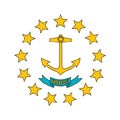THE PRESIDENT. I saw Secretary Rogers at that time. It was quite a class. It was what we called 442.1 We came here in August when it was hot, and I remember trudging along on this pavement. We called it a pavement then, of course, it was the airstrip. The main thing that I accomplished here was that my wife said that I had never stood straighter than when I finished that e months' training, because I tend to slump.
1 The President and Secretary of State William P. Rogers were classmates in the Officer Candidate School at Quonset Point Naval Air Station. They were commissioned lieutenants (jg.), in September 1942.
I have always marveled at the fact that people who are in the military service, like General Eisenhower, always have such erect posture. But those of us who were in it as I was, and so many in World War II, for only 3 years, we soon get back to our old habits. We slump too much. My wife always says, "I just wish you would stand as straight as you did when you came from Quonset."
Q. What does David [Eisenhower] say about it, Mr. President? Has he indicated his feeling on this training?
THE PRESIDENT. He has done exceptionally well in his training. I am very proud of the fact that he ended up in the top 10 percent of his class. He has a sense of duty. He naturally has the feeling that any young man newly married has, about taking time out of his life, being away from his wife, but he also recognizes the necessity for service, as I think the great majority of young Americans do.
Q. Has he enjoyed his training at Newport?
THE PRESIDENT. I suppose his attitude would be about the same as mine. You know, when I was here, that training was hard work. You had to learn so many new things, like navigation. I was an aviation officer but we had to learn about navigation and subjects that were completely foreign to me.
The only one that was very easy for me was they had a course in naval courts and boards. You know, for a lawyer that was duck soup. But those other courses I must say were very difficult. It was hard for civilians to go into the service, to learn not only the discipline but to learn the new kinds of subjects that we had never been exposed to before.
David, I think, has had that same problem, because he came out of a liberal arts college, as I did, with a history major and then had to go right into the service. You had to learn very, very fast. Fortunately, he got it when he was a little younger. I had been out for about 5 years before I went into the service. I had been practicing law.
You see, I left law school in 1937, and I came here in 1942, so I had been out 5 years. And every year you are away from school it is harder to go back to school, I find, at least.
But I must say that it was an experience that, looking back, I, of course, do not regret. It is one of those things you say, "I wouldn't have missed it, but I wouldn't want to do it again."
Q. Where did you go from here, Mr. President?
THE PRESIDENT. You know, you apply for something, and they give you something else. That hasn't changed, I understand.
I went to what was the Naval Air Station at Ottumwa, Iowa. And I will tell you, when I got there, it was a cornfield and nothing else. For 5 months we worked on that station. I was aide to the executive officer and later aide to the commanding officer.
When I left there to go overseas we had an airstrip, and it was one of the major training bases for Navy pilots.
Q. Ottumwa?
THE PRESIDENT. Ottumwa. O-t-t-um-w-a. It is a major meat packing center in Iowa.
Then from there, after my 5 months there, I went overseas and served in the South Pacific for about a 14-month tour.
Q. Do you have happy memories of Quonset?
THE PRESIDENT. Yes. Well, the first e or 3 weeks were the hardest. You know, learning to---you have to shine your shoes.
Q. I can tell you did those pretty well.
THE PRESIDENT. Oh, I didn't do this. I never got very high marks for that.
Because you know, you shine your shoes and your clothes have to be straight and you have got to stand straight. You learn all of those things that really are so foreign to a civilian. But I think humility is good for any individual. And one thing you learn when you go in the service, particularly somebody who comes, as I did, from a pretty good educational background-and I was reasonably successful as a lawyer-and then you go in there, and, as I said a moment ago, the chiefs run the Navy. Believe me, those Navy chiefs-they put you in your place and that is good for anybody.
Thank you.
Note: The exchange of remarks began at approximately 10: 45 a.m.
Richard Nixon, Exchange of Remarks With Reporters at Quonset Point Naval Air Station, Rhode Island. Online by Gerhard Peters and John T. Woolley, The American Presidency Project https://www.presidency.ucsb.edu/node/254528


